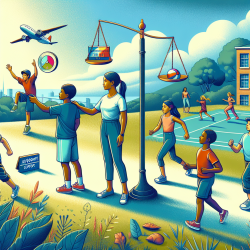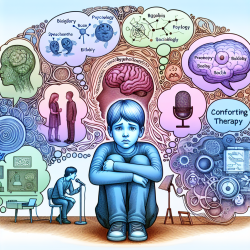Introduction
In the realm of speech-language pathology and educational interventions, fostering positive outcomes for children is paramount. The PETALS trial, a study published in BMC Public Health, offers valuable insights into how autonomy support in physical education (PE) can potentially enhance students' engagement in leisure-time physical activity. While the study's findings did not demonstrate significant changes in physical activity behavior, they underscore the importance of understanding the trans-contextual model (TCM) and its application in educational settings.
Understanding the Trans-Contextual Model
The TCM is a theoretical framework that explains how autonomy support in one context, such as PE, can influence motivation and behavior in another, like leisure-time physical activity. It integrates concepts from self-determination theory, the theory of planned behavior, and the hierarchical model of intrinsic and extrinsic motivation. The model posits that when students perceive autonomy support from their PE teachers, it enhances their autonomous motivation, which can transfer to other contexts, encouraging leisure-time physical activity.
Key Findings from the PETALS Trial
The PETALS trial aimed to test the efficacy of a PE-delivered autonomy supportive intervention. Despite the intervention not leading to significant changes in physical activity behavior, the study provided several insights:
- Autonomy Support: Perceived autonomy support was linked to increased autonomous motivation in PE, which in turn was associated with autonomous motivation in leisure time.
- Motivation Transfer: The transfer of motivation from PE to leisure contexts was evident, supporting the TCM's premise.
- Need for Further Research: The study highlighted the necessity for more research to explore the TCM's validity and the impact of manipulating other model variables through experimental studies.
Implications for Practitioners
For practitioners in educational and therapeutic settings, the PETALS trial offers several takeaways:
- Focus on Autonomy Support: Enhancing autonomy support in PE can foster motivation that extends beyond the classroom. Practitioners should consider training programs for teachers that emphasize autonomy-supportive behaviors.
- Holistic Approach: While autonomy support is crucial, integrating other motivational and ecological factors can provide a more comprehensive approach to promoting physical activity.
- Further Exploration: Encouraging further research into the TCM and its application can help refine strategies for promoting physical activity among students.
Conclusion
The PETALS trial underscores the potential of autonomy support in PE to influence students' motivation and behavior in leisure-time physical activity. Although the study did not find significant behavioral changes, it provides a foundation for further research and practical applications. By understanding and leveraging the TCM, practitioners can better support children's physical activity engagement, contributing to their overall well-being.
To read the original research paper, please follow this link: Testing a physical education-delivered autonomy supportive intervention to promote leisure-time physical activity in lower secondary school students: the PETALS trial.










